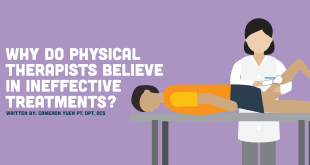Why should you become a clinical instructor?
You may be thinking “I didn’t choose to become a teacher. Why would I want to become a clinical instructor (CI) and take students?” Think about it this way: someone took YOU on as a student when they didn’t have to. Don’t we all owe it to the profession to give back? Despite what you may think, you can actually learn a lot by becoming a clinical instructor. The students aren’t the only ones who benefit from your time!
In one of the songs from the Tarzan soundtrack, I have a favorite line that goes, “In learning you will teach and in teaching you will learn”. No matter the profession, we are meant to pass on knowledge to those coming after us – and we all know that experience is the best teacher. I have learned so much more since graduating than I ever did in a classroom, thanks mostly to excellent mentors. Book knowledge gives you a foundation, but application, clinical reasoning, and professional growth can only come from a real-life setting with a patient in front of you. In physical therapy, this real-life learning starts with a clinical instructor.
Regardless of your clinical rotation settings, you gain so much knowledge and valuable experience by just being under the direction of a CI (even if you aren’t in the exact setting you want to be in). The time spent with a clinical instructor is built-in physical therapy mentorship that helps shape the future clinicians of physical therapy. Therefore, I strongly encourage you to pursue the path of a clinical instructor at some point in your career. It is one of the best ways to boost our profession.
What are the requirements for becoming a clinical instructor?
- Current license as a physical therapist or physical therapist assistant
- Minimum of 1 year clinical experience (attested by your job history and/or supervisor)
- Completion of the 2 part Clinical Instructor Credentialing Course (part 1 is sometimes online, but classroom time is required)
How much does the Clinical Instructor Credentialing Course cost?
- Varies by course
- Usually between $75 and $180
- Higher cost for non-APTA members
How long does the course take?
- Varies by course
- Usually 1-2 days for the classroom portion
What are the benefits of becoming a Credentialed Clinical Instructor?
- CCI certification (Credentialed Clinical Instructor)
- Registry in national database of credentialed instructors
- CEU hours (varies by course)
- Access to continuing education workshops at discounted rates
- The certification does not require re-certification or ongoing CEU hours to maintain
- Enhanced knowledge and skills in preparing for and maintaining a beneficial clinical experience with students
- Stay up to date on new information/research being taught in schools
- Looks good on a physical therapy resume
What makes a good clinical instructor?
Now that we have covered the basics, let’s talk about what makes a good CI. In 2008, an article was published in the Academic Medicine journal with the title “What Makes a Good Clinical Instructor?”. The authors identified 68 articles published between 1909-2006. They found that most qualities associated with “exceptional instructors” were non-cognitive qualities, such as communication, emotion/enthusiasm, personality, and character.
Another article from 2009 published in Athletic Therapy Today listed 9 essential qualities necessary for clinical instruction. These included: legal/ethical behavior, evaluation, assessment, communication, supervision, instruction, administration, professional development, and interpersonal skills. (You might recognize these from the CPI grading tool used for student evaluation).
Those traits not taught in school, which help us inspire our patients in the clinic, are the same ones used to instill confidence in our students as they progress through their education. As a CI it is important to provide an atmosphere that is non-threatening and conducive to learning and questions. Additionally, a good CI will foster a relationship that emphasizes levity and confidence. If the students are having fun, they will retain more information and will look forward to their careers ahead.
I tell all of my students, “you aren’t treating a diagnosis or a set of symptoms, you are treating a person and all that comes with that person”. In the same way, you are not simply instructing a student as a clinical instructor; you are guiding them in a field they are likely to spend the next 30 years in. They should look forward to it.
– Maya Angelou
References
http://www.apta.org
http://www.natajournals.org
http://www.aliem.com
 NewGradPhysicalTherapy.com The Largest Online Resource For New Grad Physical Therapists
NewGradPhysicalTherapy.com The Largest Online Resource For New Grad Physical Therapists







